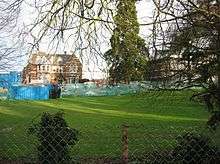Preparatory school (United Kingdom)

A preparatory school (or prep school) in the United Kingdom is a student selective, fee-paying independent primary school which caters primarily for children up to approximately 13. The term preparatory school is used as it prepares the children for the Common Entrance Examination to get them into a private independent secondary schools including the prestigious English public schools.[1] They are also now used by parents in the hopes of getting their child into a good state selective grammar school.[1]
Overview
Boys' prep schools are generally for 8- to 13-year-olds, who are prepared for the Common Entrance Examination, the key to entry into many secondary independent schools. Before the age of seven or eight, the term "pre-prep school" is used.[1] Girls' private schools in England tend to follow the age ranges of state schools more closely than those of boys. Girls' preparatory schools usually admit girls from the age of four or five, who will then continue to another independent school at 11, or at 13 if the school is co-educational (as most secondary schools now are). However, as more girls now go on to formerly single-sex boys' schools which have become co-educational, the separation is less clear.
There are 130,000 pupils in over 500 schools of all types and sizes. Prep schools may be for boys or girls only, or may be co-educational. They may be day schools, boarding schools, weekly boarding, flexi-boarding, or a combination. They fall into the following general categories:[2][3]
- Wholly independent prep schools, both charitable and proprietary
- Junior schools linked to senior schools
- Choir schools, which educate child choristers of cathedrals and some other large religious institutions; they all accept non-chorister pupils with the exception of Westminster Abbey Choir School; these schools are usually affiliated to Anglican churches, but may occasionally be associated with Catholic ones such as Westminster Cathedral
- Schools offering special educational provision or facilities
- Schools with particular religious affiliations
The Independent Association of Preparatory Schools (IAPS) is a prep schools heads association; one of seven affiliated associations of the Independent Schools Council.[2]
History
Originally developed in England and Wales in the early 19th century as boarding schools to prepare boys for leading public schools, such as Eton and Winchester, the numbers attending such schools increased due to large numbers of parents being overseas in the service of the British Empire. They are now found in all parts of the United Kingdom, and elsewhere.
Psychological effects of boarding
There is a growing body of knowledge supporting the view that being sent away to boarding school at an early age can result in long-term psychological harm.[4][5][6][7] In 2008 it was announced that a committee of MPs was to investigate and look at the social and emotional impact of separating youngsters from their parents and the "possible dangers" of children being sent to boarding school at a young age.[8]
References
- 1 2 3 "What is a Preparatory School?". Gettherightschool.co.uk. Retrieved 2016-10-02.
- 1 2 The Independent Association of Prep Schools. "About Us". Iaps.uk. Retrieved 2016-10-02.
- ↑ Chapel Studios - www.chapel-studios.co.uk. "IAPS | The Independent Association of Prep Schools". Iaps.uk. Retrieved 2016-10-02.
- ↑ Joy Schaverien. "BOARDING SCHOOL SYNDROME: BROKEN ATTACHMENTS A HIDDEN TRAUMA - Schaverien - 2011 - British Journal of Psychotherapy - Wiley Online Library". Onlinelibrary.wiley.com. Retrieved 2016-10-02.
- ↑ Lakhani, Nina. "Boarding is as damaging as being taken into care, says therapist". The Independent. Retrieved 2016-10-02.
- ↑ "Relationship Counselling for Boarding School Survivors". Relatenow.co.uk. Retrieved 2016-10-02.
- ↑ Claire Winter (2010-09-23). "Learning Parents Blog: Boarding school at eight years old?". BBC. Retrieved 2016-10-02.
- ↑ Anushka Asthana, education correspondent. "Boarding school 'may harm children' | Education". The Guardian. Retrieved 2016-10-02.
External links
- Incorporated Association of Preparatory Schools
- Independent Schools Council
- THE MAKING OF THEM - The British Attitude to Children and the Boarding School System